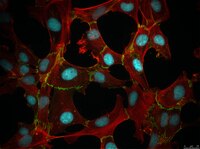SCC443 Sigma-Aldrich12Z Human Endometrial Epithelial Cell Line
The N-cadherin-positive 12Z human endometrial cell line is an established model for tissue invasion in endometriosis, and is used to study disease progression, pathogenesis, and therapeutic intervention.
More>> The N-cadherin-positive 12Z human endometrial cell line is an established model for tissue invasion in endometriosis, and is used to study disease progression, pathogenesis, and therapeutic intervention. Less<<Recommended Products
Overview
| Replacement Information |
|---|
| References |
|---|
| Product Information | |
|---|---|
| Quality Level | MQ100 |
| Biological Information | |
|---|---|
| Cell Line Type |
|
| Physicochemical Information |
|---|
| Dimensions |
|---|
| Materials Information |
|---|
| Toxicological Information |
|---|
| Safety Information according to GHS |
|---|
| Safety Information |
|---|
| Product Usage Statements | |
|---|---|
| Quality Assurance | Each vial contains ≥1X10⁶ viable cells. Cells are tested negative for infectious diseases by a Human Essential CLEAR Panel by Charles River Animal Diagnostic Services. Cells are verified to be of human origin and negative for interspecies contamination from rat, mouse, Chinese hamster, Golden Syrian hamster, and Non-human Primate (NHP) as assessed by a Contamination Clear panel by Charles River Animal Diagnostic Services Cells are negative for mycoplasma contamination. |
| Usage Statement |
|
| Packaging Information | |
|---|---|
| Material Size | ≥1X10⁶ cells/vial |
| Transport Information |
|---|
| Supplemental Information |
|---|
| Specifications |
|---|
| Global Trade Item Number | |
|---|---|
| Catalogue Number | GTIN |
| SCC443 | 04065268850961 |
Documentation
12Z Human Endometrial Epithelial Cell Line SDS
| Title |
|---|
Data Sheet
| Title |
|---|
| Data Sheet-SCC443 |











